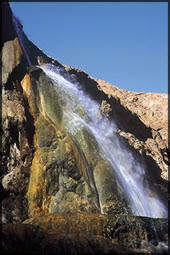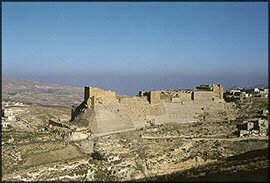 COUNTRY COUNTRY |

 Geography Geography |
Jordan is a relatively small country situated at the junction of the Levantine and Arabian areas of the Middle East. The country is bordered on the north by Syria, to the east by Iraq, and Saudi Arabia on the east and south. To the west is Israel and the occupied West Bank, while Jordan's only outlet to the sea, the Gulf of Aqaba, is to the south. Jordan occupies an area of approximately 96,188 square km.
 Climate Climate |
Western Jordan has essentially a Mediterranean climate with a hot, dry summer, a cool, wet winter and tow short transitional seasons. However, about 75% of the country can be described as having a desert climate with less that 200mm of rain annually. Jordan can be divided into three main geographic and climatic areas: the Jordan Valley, the Mountain Heights Plateau, and the eastern desert or Badia region.
 Peoples Peoples |
Jordan's population is estimated at nearly 4.3 million (1995). The last census was taken in 1994. Jordan's high fertility rate of 5.2 and declining mortality rate result in a high population increase, which averages 3.8% annually. Jordan's stability in a turbulent region has attracted large numbers of refugees and temporary residents from neighboring regions such as the West Bank, the Gaza Strip and Lebanon. In recent years it has also seen tens of thousands of Jordanian expatriates returning from abroad.
Approximately 78% of Jordan's people reside in major cities such as Amman, Zarqa, Irbid, Salt, Mafraq, Karak, Tafileh, Ma'an and Aqaba. Amman, the capital, comprises 38% of the country's population.
The modern history of Jordan has given the country a population derived from many ethnic backgrounds. The "native" Jordanians are the bedou and the inhabitants of the settled villages and towns that have existed in the land of Jordan for millennia.
|
The Bedou, or Bedouin as they are called in English, are the inhabitants of the semi-arid, steppe-like desert, called the Badia in Arabic. Originally nomadic or semi-nomadic desert dwellers, the bedou migrate seasonably along fixed routes defined by their sources of pasturage and water. In the winter, the bedou migrate to the rich lands of the Jordan Rift Valley to escape the harsh desert conditions. Traditionally herders, the bedou would take their animals, families, tents and few belongings with them. Today, most Bedou have become urbanized or semi-nomadic.

During the late 19th and early 20th centuries, periodic waves of people from the Caucasus region of Asia, Armenia, Palestine, the Hijaz (western Saudi Arabia), Syria and Iraq settled in Jordan, adding to the ethnic mix of the indigenous population.
The Circassians came from the Caucasus region in the late 19th century. The Circassians' loyalty to King Abdullah and their expertise in farming prompted the King to allocate large tracts of land to them. Circassians also hold key positions in the army and serve as the King's ceremonial bodyguards. Although fiercely loyal to Jordan and devout Muslims, the Circassians retain their own customs and habits, and still speak their own language alongside Arabic. Also from the Caucasus region are the Chechen, who retain their own customs and language.
Another ethnic group that migrated to Jordan is the Armenians. Unlike the Circassians and Chechen, the Armenians are Christian, and have also retained their language, customs and habits. Traditionally skilled at manual crafts, the Armenians long excelled in fields such as jewelry making, photography and maintenance of machinery. Today they are integrated in all economic sectors of society.
The expatriate workers in Jordan also add diversity to the ethnic mix of the population. Jordan hosts approximately 200,000 Egyptian workers, and perhaps another 80,000 Filipinos, Sri Lankans, Indians, Pakistanis, Syrians, Lebanese, Europeans, and North Americans.
 Language Language |
The National language is Arabic, although most people speak some English, so it is relatively easy to get around.
|

